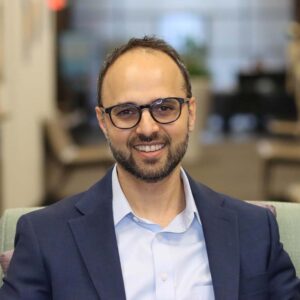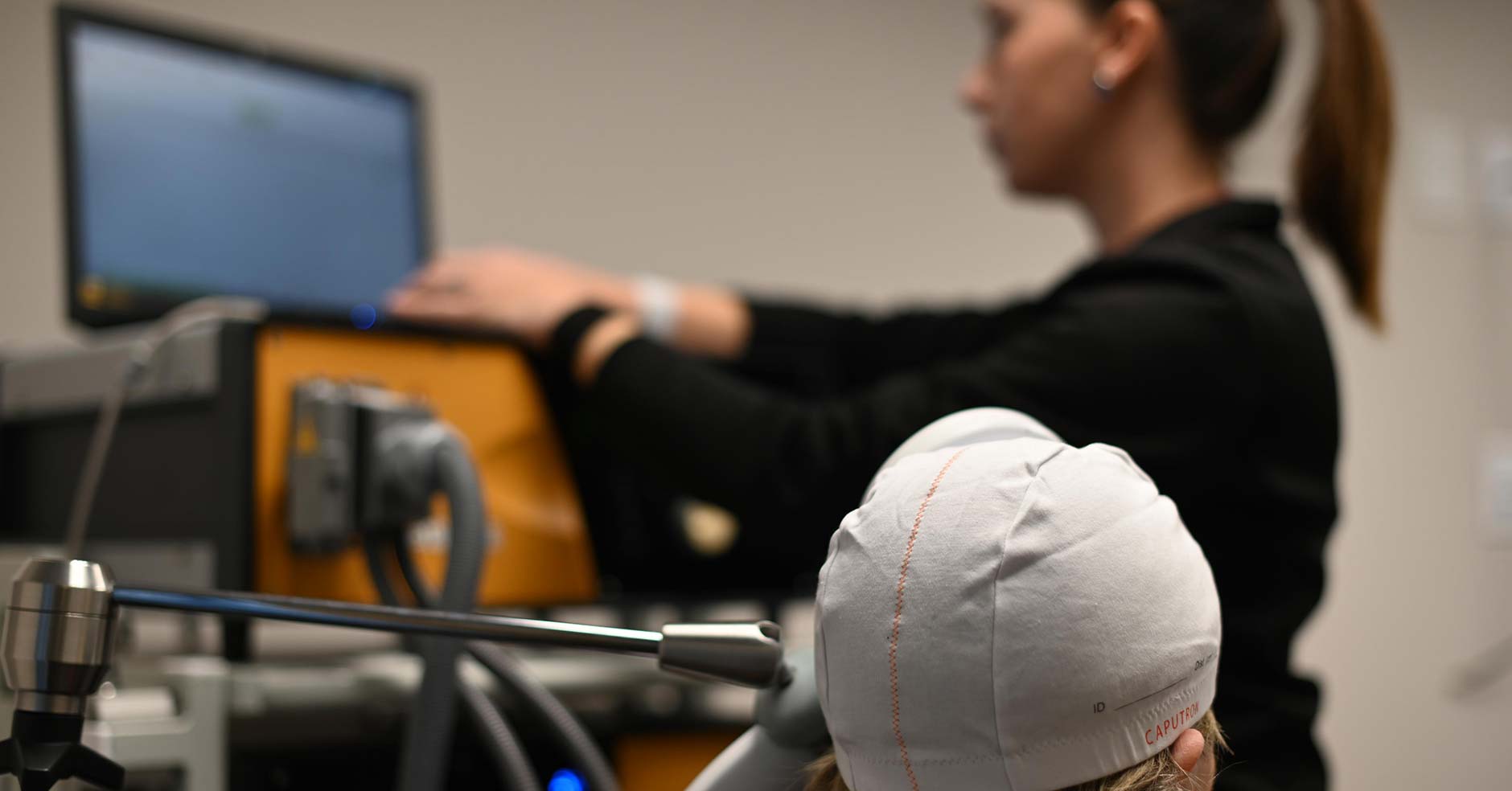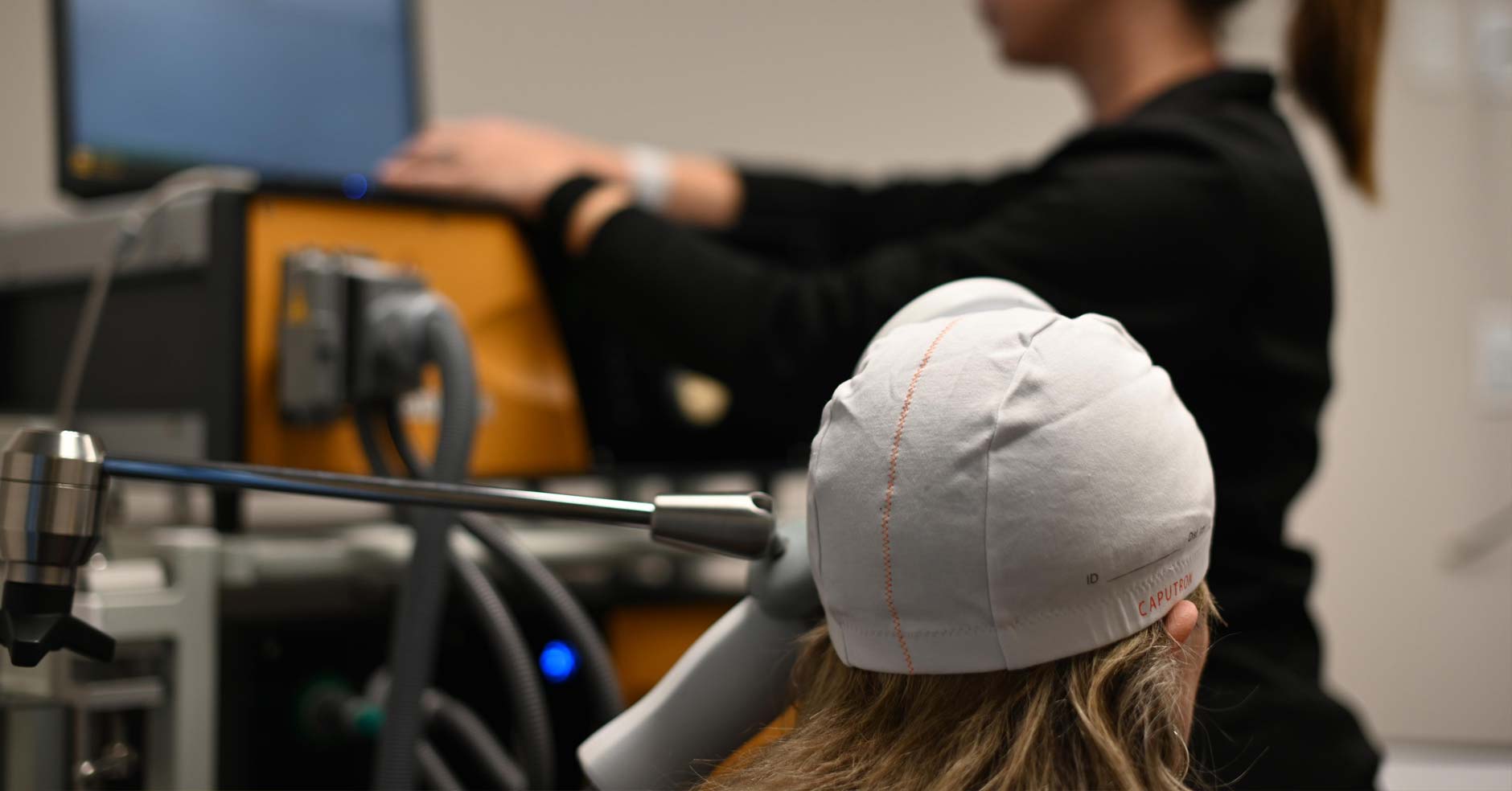Transcranial magnetic stimulation at Wellward Medical offers hope to patients with treatment-resistant depression
LEXINGTON As a teenager, Jane felt like she was different than her friends. Up until high school, she was energetic, optimistic, and the one her friends sought for support. What started as a period of darkness evolved to a chronic history of recurrent and deep depression. By the time she was in her forties, she carried with her the heavy burden of failed treatments including medication, psychological counseling, and even electroconvulsive therapy (ECT).
“I felt like I was fading away, not just from my life but from the lives of those I love,” she shared, recounting the litany of medications and the disorienting rounds of ECT that had left her feeling more like a “foggy ghost,” as she described, than a person. Her story is not unlike those of many of the patients who struggle with treatment resistant depression. This affects up to half of all patients treated for depression, many of whom have tried and failed to find relief with conventional treatments of medications and talk therapy.
When she was referred to Wellward Medical, she had resigned herself to the realization that this was who she was, until transcranial magnetic stimulation (TMS) rekindled a flicker of hope. “When my doctor suggested TMS, I discovered it wasn’t about changing my medication routine; it was about changing my brain’s routine,” she said. This scientifically grounded optimism is at the core of TMS therapy—a noninvasive procedure that uses repetitive magnetic pulses to stimulate specific regions of the brain, encouraging a return to normal function.
TMS is a novel modality in psychiatry. In treating mood disorders, the mainstay of psychiatry has been to augment a deficit of certain neurotransmitters. Whereas medications either enhance production or inhibit degradation of certain neurotransmitters, TMS accomplishes the same goal by stimulating and reinforcing the circuits that build the

same neurotransmitters endogenously.
The principle is straightforward. Complex cognitive processes like mood and executive function take place in multiple foci of the brain linked together within networks. In recurrent affective disorders, these networks fall into a cycle of disarray.
“By focusing on the dorsolateral prefrontal cortex, TMS uses induction currents, similar to the mechanism that charges your phone wirelessly, to exercise specific circuits in the brain,” says Danesh Mazloomdoost, MD, known to his patients as Dr. Danesh, medical director of Wellward Medical. This engages the part of the brain where diminished activity is often linked to depression.
“Each session felt like a step toward myself,” Jane reflected. “It was as if someone was gently knocking on the door of my mind, reminding it to wake up.”
Jane’s treatments were brief, daily engagements with the TMS machine, lasting just minutes but building a foundation for lasting change over several weeks. Unlike the systemic effects of antidepressants or the cognitive risks of ECT, TMS offered Jane a targeted approach without the side effects that had long overshadowed her treatment history. “I walked out feeling clearer, not cloudier,” she noted, a sentiment that resonates with many who undergo TMS.
The growing recognition of TMS in treating conditions like treatment-resistant depression and obsessive-compulsive disorder has positioned it as a beacon of innovation in psychiatric care, gaining broad-spectrum insurance coverage. As neural mapping and understanding about physiology evolves, more indications are being studied. At Wellward, the team is considering using TMS for chronic pain by regulating and desensitizing the pain processing centers of the brain. There is also research in using it to stimulate the punitive and reward centers of the brain in treating addiction, facilitating recovery from stroke, reducing the impact of movement disorders, helping patients with attention and hyperactivity, and much more.
“We’re not just seeing symptoms ease,” says Dr. Danesh. “We’re seeing lives reclaimed with focused attention to particular regions of the brain.”
Within their treatment framework, Wellward incorporates other novel psychiatric innovations, enhancing and complementing the effects of TMS. One such treatment is the use of ketamine, known for its rapid-acting antidepressant properties and its ability to foster neuroplasticity. “Ketamine is a catalyst,” Dr. Danesh notes. “In conjunction with TMS, it not only accelerates treatment but allows patients to engage in therapy from a whole new perspective, one that shows a greater degree of compassion for self that many struggle with in their depressed state.”
For patients struggling with anxiety or PTSD as the aftermath of trauma, another innovative treatment used by Wellward is the stellate ganglion block (SGB). Following physical or emotional trauma, the autonomic system can undergo neuroplastic changes.

that increase the activity of the sympathetic system. This leaves people in chronic state of “fight or flight,” perpetuating the reaction from trauma. Studied most among veterans with PTSD, SGB helps reset the setpoint of the autonomic system.
“It’s not just about treating an illness, it’s about fostering a holistic sense of health,” Dr. Danesh describes.
These treatments, while innovative, are not standalone solutions at Wellward. They are integrated within Wellward’s HEAL framework of Health, Energy, Activity, and Lifestyle. This is a comprehensive care model for treating both physical and emotional pain through the dimensions represented by HEAL: Health represents the pursuit of medical well-being; Energy focuses on balancing mood and the autonomic nervous system, crucial for transitioning between states of stress and relaxation; Activity emphasizes movement as medicine; and Lifestyle encompasses the routines of selfcare that sustain long-term health.
“We see TMS, ketamine, and stellate ganglion blocks not just as treatments, but as tools,” Dr. Danesh clarifies. “Tools that, when used within our HEAL framework, empower our patients to take charge of their health and reclaim their lives.” Health coaching and group sessions, pillars of the HEAL framework, complement the TMS therapy, providing patients with a community and a curriculum designed to sustain and nurture their journey to wellness.
“There is solidarity here,” Jane observed. “You feel part of a collective stride toward better health.”
Dr. Danesh, speaking to the collaborative nature of Wellward’s approach, underscored the value of this support system. “Our aim is to arm our patients with the tools they need to navigate their health long term,” he said. “When we talk about recovery, we’re talking about an enduring return to wellness, and that’s a path we walk together with our patients.”
Wellward’s model is reflective of a larger shift in mental health treatment—a shift towards recognizing the patient as a whole person. “It’s about seeing beyond the diagnosis,” Jane expressed. “At Wellward, I’m not just a case of depression; I’m a person with a story, with goals, with a life to return to.”
For physicians considering a referral to Wellward, the clinic represents a partnership in patient care, one that honors the complexity of mental health and the individuality of each patient. “Referring to Wellward means you’re not passing off a problem; you’re opening up a pathway,” Dr. Danesh assures his colleagues. In the journey of Jane’s resilience and transformation, we witness the profound impact of comprehensive, innovative psychiatric care. Her story, a reflection of the many individuals who confront the relentless grasp of treatment-resistant depression, highlights the pivotal role of transcranial magnetic stimulation (TMS) as a beacon of hope in the evolving landscape of mental health treatment.
As Wellward continues to champion the cause of patient-centered care, we are reminded that true healing extends beyond the realm of diagnoses and prescriptions, offering patients not just a return to wellness but a renewed lease on life.


